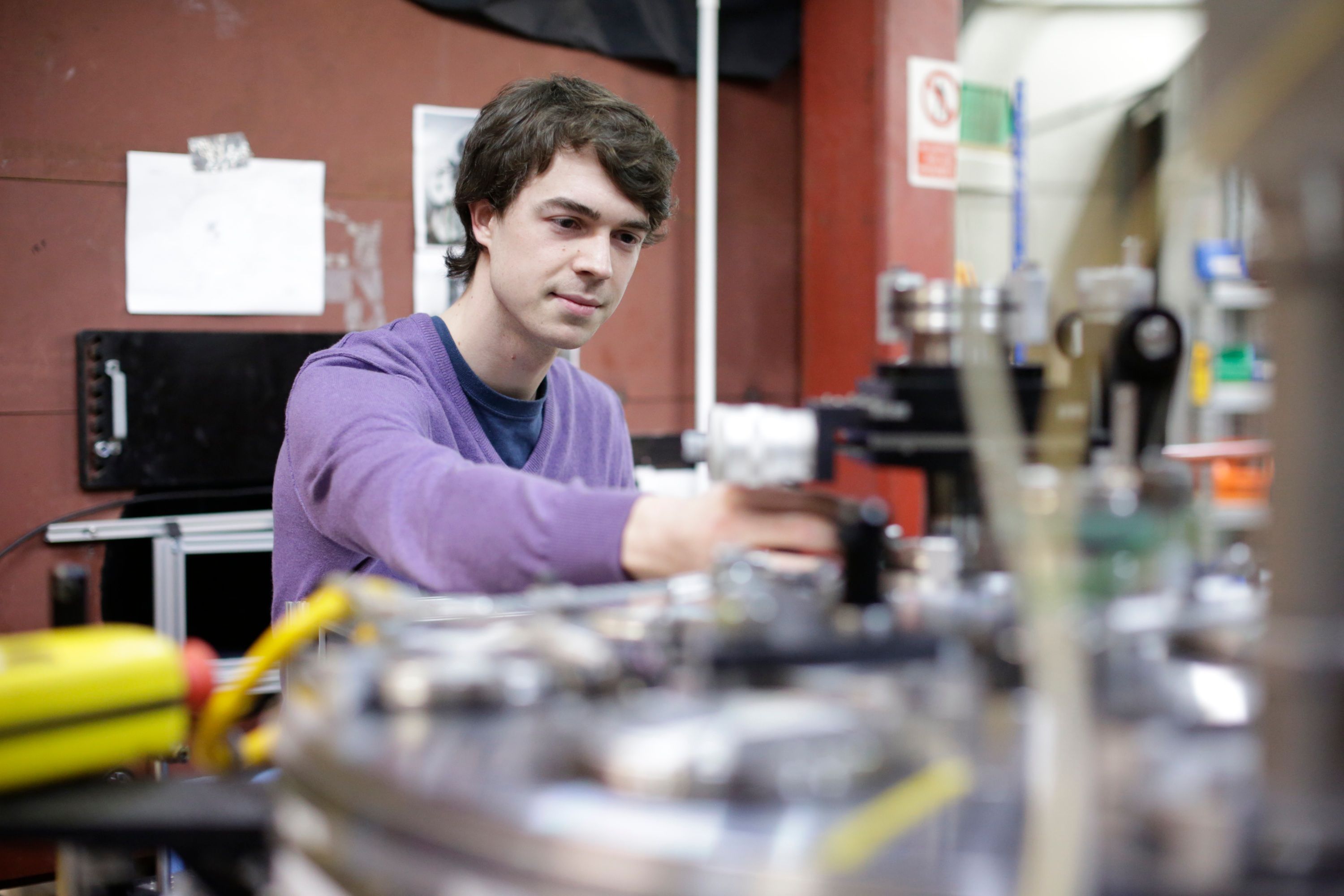
Photonics
Develop your interests and skills in photonics and be trained in research methods.
Develop your interests and skills in photonics and be trained in research methods
Carry out substantial laboratory and project work in one of the UK’s largest centres for optics research and application
Undertake a significant research project in preparation for PhD study
Course key facts
-
Qualification
-
MRes
-
-
Duration
1 year
-
Start date
September 2024
-
Study mode
Full-time
-
Fees
£15,800 Home
£35,600 Overseas
-
Delivered by
-
Location
-
South Kensington
-
Minimum entry standard
-
First class Honours in physics, electrical or electronic engineering or a relevant scientific discipline
Course overview
Develop your appreciation of photonics and prepare for further research training on this Master's course.
You'll advance your understanding of this exciting area of physics, which enables developments in fields as diverse as biomedical imaging and high power fibre lasers.
Built on our MSc in Optics and Photonics course, this usually forms the first year of the four-year MRes+PhD research training programme in the Photonics group.
You'll develop research interests and skills in photonics and receive training in appropriate research methods.
The course will enhance your written and communication skills for a diverse range of audiences. A substantial taught laboratory element also helps reinforce the practical expertise required to pursue further research.
A major individual project will also provide you with a thorough preparation for PhD study, with the work assessed by oral presentations and a dissertation.
Structure
This page is updated regularly to reflect the latest version of the curriculum. However, this information is subject to change.
Find out more about potential course changes.
Please note: it may not always be possible to take specific combinations of modules due to timetabling conflicts. For confirmation, please check with the relevant department.
You’ll take all of these core modules and complete a full-time project looking into a specialist area of optics research.
Core modules
Explore themes including Fermat's Principle, Snell's law, stops and pupils, complex amplitude and the resolution of imaging systems.
Gain an understanding of the fundamentals of laser physics.
Explore common optical measurement and devices, learn about polarisation, and discover practical techniques for the manufacture of thin film devices.
Follow a set of experiments and become familiar with a wide variety of optical techniques and phenomena.
You’ll also choose optional modules to a total of 7.5 to 10 ECTS.
Optional modules
Understand the operation principles and technology of optical fibre networks and analyse the key physical concepts underlying laser and nonlinear optics.
Explore elements of optimal design including finite ray tracing, chromatic aberrations, and the use of aspheric surfaces in imaging systems.
Become familiar with the principles and practice of laser devices and nonlinear optical technology.
Analyse the principles and practice of biomedical imaging technologies, including microscopes, fluorescence and tomography.
Examine the most important device components from the worlds of optical telecommunication, space lighting, optical displays and sustainable energy production.
Discover how fibre and ultrafast lasers work and gain insight into why they are such useful tools in a wide variety of scientific and industrial applications.
You’ll carry out a nine-month project with a research group.
This work will equip you for further academic study at doctoral level in photonics, and in subjects where photonics is an important enabling science.
Your project will be assessed by an oral presentation and a dissertation.
Teaching and assessment
Balance of teaching and learning
Key
- Lectures and classes
- Laboratory work
- Project work
- 25% Lectures and classes
- 8% Laboratory work
- 67% Project work
Teaching and learning methods
-
Virtual learning environment
-
Lectures
-
Lecture recordings
-
Practical work
-
Problem classes
-
Tutorials
-
Self-study project
Balance of assessment
Key
- Written examinations
- Laboratory work
- Project work
- 26% Written examinations
- 8% Laboratory work
- 66% Project work
Assessment methods
-
Examination
-
Oral presentation
-
Problem exercises
-
Written report
Entry requirements
We consider all applicants on an individual basis, welcoming students from all over the world.
How to apply
Apply online
You can submit one application form per year of entry. You can choose up to two courses.
Application deadlines – Round 4 closes on Friday 24 May 2024
We operate a staged admissions process with several application rounds throughout the year.
Apply by midnight (UK time) on the relevant application round deadline to ensure that you receive the outcome of your application by the decision date.
We recommend applying as early as you can – we cannot guarantee that places will be available, or that courses will remain open, in later rounds.
Application rounds
Round 1
- Apply by 3 November 2023
- Decision by 16 December 2023
Round 2
- Apply by 19 January 2024
- Decision by 9 March 2024
Round 3
- Apply by 4 April 2024
- Decision by 11 May 2024
Round 4
- Apply by 24 May 2024
- Decision by 27 July 2024
Round 5
- Apply by 5 July 2024
- Decision by 3 August 2024
There is no application fee for MRes courses, Postgraduate Certificates, Postgraduate Diplomas, or courses such as PhDs and EngDs.
If you are applying for a taught Master’s course, you will need to pay an application fee before submitting your application.
The fee applies per application and not per course.
- £80 for all taught Master's applications, excluding those to the Imperial College Business School.
- £100 for all MSc applications to the Imperial College Business School.
- £150 for all MBA applications to the Imperial College Business School.
If you are facing financial hardship and are unable to pay the application fee, we encourage you to apply for our application fee waiver.
Find out more about how to apply for a Master's course, including references and personal statements.
Unless you are from an exempt nationality, you will need an ATAS certificate to obtain your visa and study this course.
Nationals from the following countries are exempt: Switzerland, Australia, Canada, Japan, New Zealand, Singapore, South Korea, USA and EEA members.
Use this information when applying for an ATAS certificate to study this course:
- CAH code: CAH07-01-01
- Descriptor: Physics
- Supervisor name: Professor Michele Dougherty
Get guidance and support for obtaining an ATAS certificate.
Tuition fees
Home fee
2024 entry
£15,800
You should expect and budget for your fees to increase each year.
Your fee is based on the year you enter the College, not your year of study. This means that if you repeat a year or resume your studies after an interruption, your fees will only increase by the amount linked to inflation.
Find out more about our tuition fees payment terms, including how inflationary increases are applied to your tuition fees in subsequent years of study.
Whether you pay the Home or Overseas fee depends on your fee status. This is assessed based on UK Government legislation and includes things like where you live and your nationality or residency status. Find out how we assess your fee status.
If you're a UK national, or EU national with settled or pre-settled status under the EU Settlement Scheme, you may be able to apply for a Postgraduate Master’s Loan from the UK government, if you meet certain criteria.
The government has not yet published the loan amount for students starting courses in Autumn 2024. As a guide, the maximum value of the loan was £12,167 for courses starting on or after 1 August 2023.
The loan is not means-tested and you can choose whether to put it towards your tuition fees or living costs.
Overseas fee
2024 entry
£35,600
You should expect and budget for your fees to increase each year.
Your fee is based on the year you enter the College, not your year of study. This means that if you repeat a year or resume your studies after an interruption, your fees will only increase by the amount linked to inflation.
Find out more about our tuition fees payment terms, including how inflationary increases are applied to your tuition fees in subsequent years of study.
Whether you pay the Home or Overseas fee depends on your fee status. This is assessed based on UK Government legislation and includes things like where you live and your nationality or residency status. Find out how we assess your fee status.
If you're a UK national, or EU national with settled or pre-settled status under the EU Settlement Scheme, you may be able to apply for a Postgraduate Master’s Loan from the UK government, if you meet certain criteria.
The government has not yet published the loan amount for students starting courses in Autumn 2024. As a guide, the maximum value of the loan was £12,167 for courses starting on or after 1 August 2023.
The loan is not means-tested and you can choose whether to put it towards your tuition fees or living costs.
How will studying at Imperial help my career?
Gain a variety of transferable skills that will be useful for further PhD study or a research career in imaging and photonics.
Physics graduates at Imperial are highly sought after in a variety of employment sectors.
These include technology, R&D, academia and education, and healthcare.
Other potential career paths include technical consultancy and science communications.
Further links
Contact the department
- Telephone: +44 (0)20 7594 7512
- Email: l.sanchez@imperial.ac.uk
Course Director: Professor Mark Neil
Visit the Department of Physics website.

Request info
Find out more about studying at Imperial. Receive updates about life in our community, including event invites and download our latest Study guide.
Request info


Terms and conditions
There are some important pieces of information you should be aware of when applying to Imperial. These include key information about your tuition fees, funding, visas, accommodation and more.
You can find further information about your course, including degree classifications, regulations, progression and awards in the programme specification for your course.
Programme specifications

